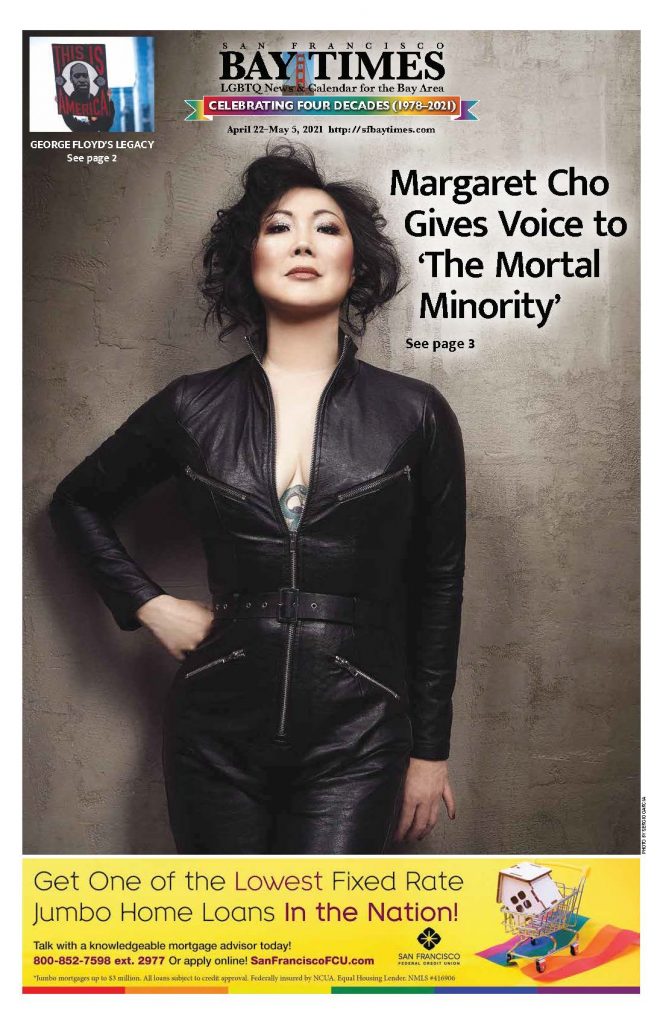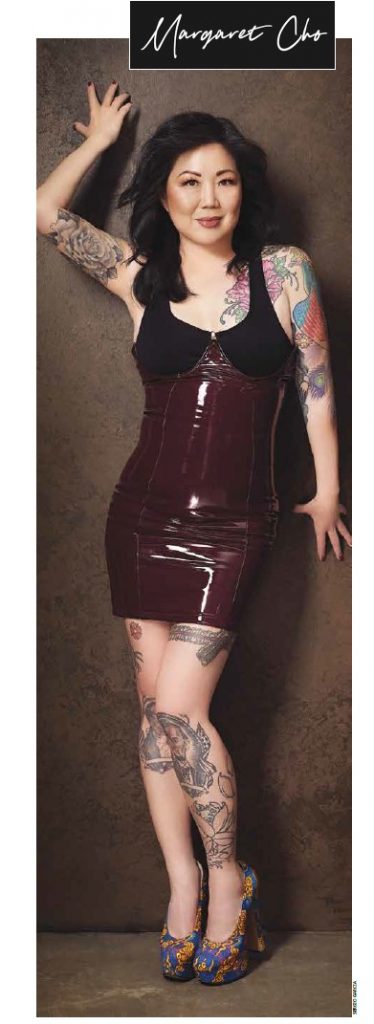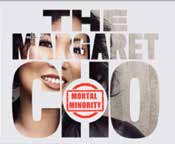
Through hard work and seemingly endless talent, Margaret Cho has earned success as a comedian, actor, musician, entrepreneur, and artist. With so much accomplishment in her creative life, the San Francisco-born star also somehow still finds time to support the causes that are important to her. For example, the openly bisexual Cho has been an advocate for the LGBTQ community for many years.
Now Cho is redoubling her longstanding social justice work in a new project that fights racism, and particularly hate against Asian American and Pacific Islander (AAPI) communities that has risen during the COVID-19 pandemic. She recently spoke with the San Francisco Bay Times about the new project, her memories of San Francisco, and more.
San Francisco Bay Times: What challenges did your family face when they came to San Francisco from Korea in 1964? They must have experienced tremendous racism, what with the Korean War only 10 years prior and due to so much else.

Margaret Cho: The challenges my family faced when they came to San Francisco from Korea were really big. They in no way felt that they could even get a foot in the door in terms of jobs or just in terms of anything. They don’t talk a lot about it. It’s something that they have tremendous PTSD (Posttraumatic Stress Disorder) from.
One of my father’s first jobs was working as a busboy at Finocchio’s, which was on Broadway and was a very famous, bustling restaurant and nightclub. He worked there for like 45 minutes. He got fired because he didn’t understand that, when you give people a breadbasket, that means a basket full of bread. When he saw four people sit down at a table, he would give them four small pieces of bread because that is what you would [expect to] get at a meal. You wouldn’t get this huge basket of bread. Things like that, he just didn’t understand. There was a real divide.
San Francisco Bay Times: Your new podcast has us realizing how much Asian-American history is too often erased from American history. How do you hope your podcast will make a positive difference, and where would you most like to see long-term beneficial changes?
Margaret Cho: I am so excited about my new podcast because there is so much about Asian-American history that we don’t know about, whether it’s the Chinese Massacre of 1871, or the Rock Springs, Wyoming, Massacre of 1885. There are so many incredible events that have shaped who Asian Americans are, and yet have been totally erased—really erased in so many ways in American history.
I am hoping that we can get a hold on how these events have shaped us in the Asian-American community. We are also talking about particular more recent events like the Fortune Teller Murders, which gave me insight into Little Saigon and the community there in the mid-2000s in Los Angeles. It is a place, like San Francisco, that I [and others] often travel to, and yet we don’t know much about the deep roots Asian Americans have left there.
I would love to see change in the way that we tell these stories in schools, in social media, and in the entertainment industry.
San Francisco Bay Times: The “model minority” myth has been incredibly destructive and is still very evident, even here in San Francisco. How can we begin to repair that damage with the truth of “mortal minority”?
Margaret Cho: The model minority myth is really damaging because it sets us apart from other minorities. It was really created in order to somehow try to keep the civil rights movement from happening. The model minority movement emerged out of this ethos that was saying there was a certain way you should be a minority, and a certain way you shouldn’t be a minority.
If you are a model minority, you don’t make a fuss about your rights. You don’t march. You don’t take action against injustice. And this was the worst thing because it set us apart from other minority communities and it took the real villain of the story, which is racism, out of the picture. It set us across from each other and fighting with each other in a way that makes white supremacy blameless. And this is a very destructive idea.
“The Mortal Minority,” the title of my podcast this season, is a way to reject the idea of a model minority. It’s a way to kill off the idea of a model minority.
San Francisco Bay Times: What do you think are some of the best things about Asian-American culture and life in San Francisco today, and what do you most miss about San Francisco when you are away from the city for extended times?
Margaret Cho: Some of the best things about Asian-American culture and life in San Francisco today are really about the food and about our presence … our long presence in San Francisco. In San Francisco, there isn’t just one Chinatown; there are a few. I like Clement Street! That’s my favorite Chinatown.
San Francisco Bay Times: When you are away from San Francisco, what else do you miss the most?
Margaret Cho: What I miss most about San Francisco is the food and all of the things about the city that really make it what it is, such as the Sunset District where I’m from. I always miss it on Valentine’s Day because there are houses that look like those candy hearts. They are that pink pastel stucco with green pastel stucco and I can just taste how pasty those candies are from how those houses look.
San Francisco Bay Times: What changes would you like to happen that move us closer to social and racial justice, particularly as they apply to the Asian-American community?
Margaret Cho: I would like to see the way that we’re talking about the Asian-American community shift and grow in the future. I would like to see more people get involved. I would like to see allyships. I would like to see more of a focus on Asian-American women and queer women who are of Asian-American descent having a voice.
It’s such a powerful thing to be able to be heard and be seen.
https://margaretcho.com/

The popular podcast The Margaret Cho this month has returned with a special second season titled “Mortal Minority.” In it, Cho and guests unpack historic crimes like the 1871 Chinatown Massacre and the 2005 Fortune Teller Murders that unfortunately have paved the way for many of the modern crimes we see today. Cho also discusses ways you can help combat hate and misinformation.
The Margaret Cho – Mortal Minority is presented by the new female-led podcast network Earios, in partnership with Acast. If you have not yet checked out Earios, we highly recommend doing so.
(https://www.earios.net/ ) We also cannot recommend enough Cho’s podcast, which for fall episodes showcases its brilliant host and the people and issues she is most passionate about now.
The Margaret Cho: https://www.earios.net/the-margaret-cho
Published on April 22, 2021
Recent Comments